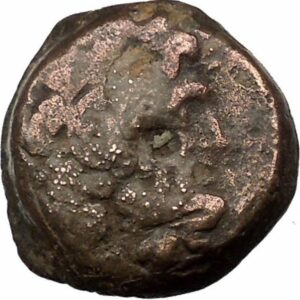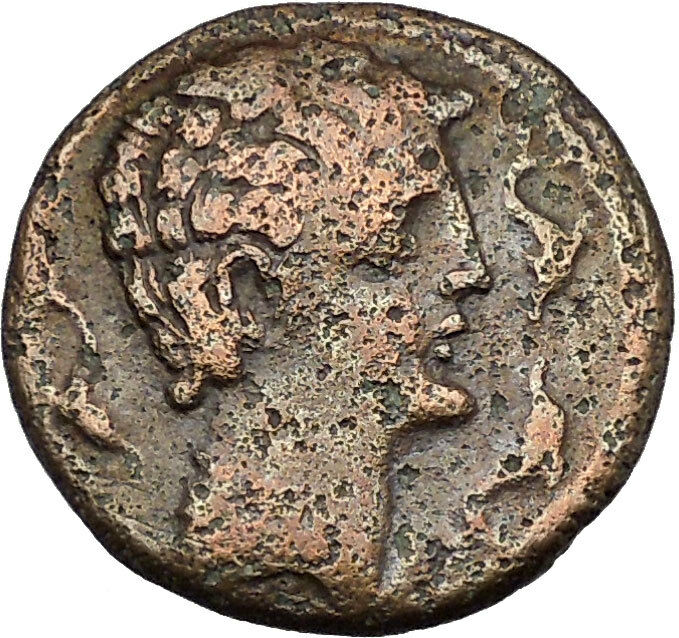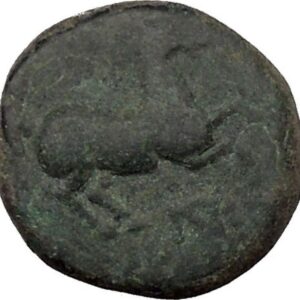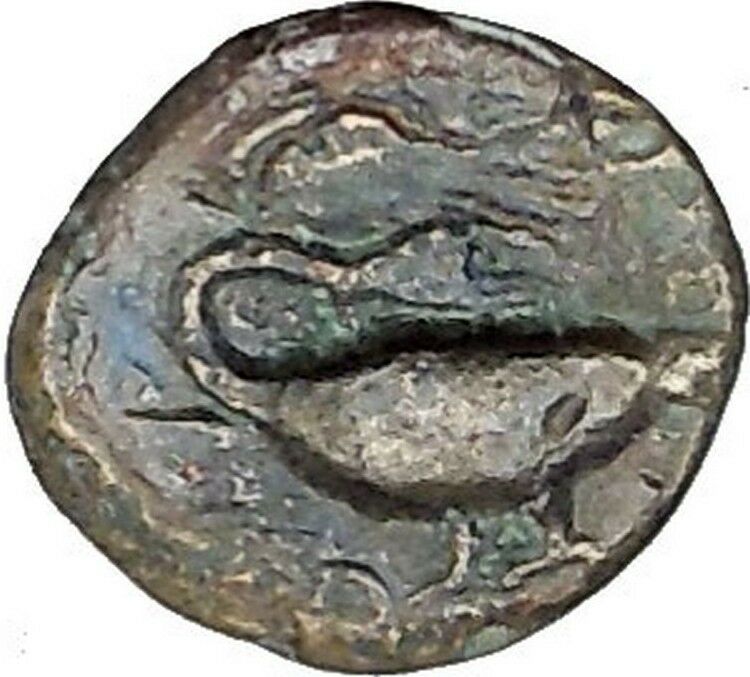|
Numerian – Roman Emperor: December 283 – November, 284 A.D.
Bronze Tetradrachm 20mm (7.24 grams) of Alexandria mint in Egypt
Issued as Caesar, Dated Regnal year 1 of Carus 282/3 A.D.
Reference: Koln 3188; Dattari 5600; cf. Milne 4664 (lacking star); Kampmann & Ganshow 114.4.
A K M A NOVMЄPIANOC K C, laureate, draped and cuirassed bust of Numerian right.
Dikaiosyne standing left, holding scales and cornucopiae; in left field, date (L A); in right field, star.
You are bidding on the exact item pictured, provided with a Certificate of Authenticity and Lifetime Guarantee of Authenticity.
In ancient Greek culture, Dikē (Greek: Δίκη, English translation: “justice”) was the spirit of moral order and fair judgement based on immemorial custom, in the sense of socially enforced norms and conventional rules. According to Hesiod (Theogony, l. 901), she was fathered by Zeus upon his second consort, Themis.
Depiction
The sculptures of the Temple of Zeus at Olympia have as their unifying iconographical conception the dikē of Zeus,[1] and in poetry she is often the attendant (paredros) of Zeus. In the philosophical climate of late 5th century Athens, dikē could be anthropomorphised as a goddess of moral justice. She was one of the three second-generation Horae, along with Eunomia (“order”) and Eirene (“peace”):
“Eunomia and that unsullied fountain Dikē, her sister, sure support of cities; and Eirene of the same kin, who are the stewards of wealth for mankind – three glorious daughters of wise-counselled Themis.”
She ruled over human justice, while her mother Themis ruled over divine justice. Her opposite was adikia (“injustice”): in reliefs on the archaic Chest of Cypselus preserved at Olympia, a comely Dikē throttled an ugly Adikia and beat her with a stick.
The later art of rhetoric treated the personification of abstract concepts as an artistic device, which devolved into the allegorizing that Late Antiquity bequeathed to patristic literature. In a further euhemerist interpretation, Dikē was born a mortal and Zeus placed her on Earth to keep mankind just. He quickly learned this was impossible and placed her next to him on Mount Olympus.
Dike Astraea
One of her epithets was Astraea, referring to her appearance as the constellation Virgo. According to Aratus’ account of the constellation’s origin, Dike lived upon Earth during the Golden and Silver ages, when there were no wars or diseases, men did not yet know how to sail, and men raised fine crops. They grew greedy, however, and Dike was sickened. She proclaimed:
Behold what manner of race the fathers of the Golden Age left behind them! Far meaner than themselves! but you will breed a viler progeny! Verily wars and cruel bloodshed shall be unto men and grievous woe shall be laid upon them.
-Aratus, Phaenomena 123
Dike left Earth for the sky, from which, as the constellation, she watched the despicable human race. After her departure, the human race declined into the Brazen Age, when diseases arose and they learned how to sail.
Numerian – Roman Emperor: December 283 – November, 284 A.D.
Caesar: 282-283 A.D. under Carus, with Carinus
Augustus: 283-284 A.D.
283 A.D. with Carus and Carinus and 283-284 A.D. with Carinus
Son of Carus | Brother of Carinus| Uncle of Nigrinian
Marcus Aurelius Numerius Numerianus (d. November, 284), known in English as Numerian, was a Roman Emperor (December 283 – November, 284), together with his brother Carinus. They were sons of Carus, a Gaul raised to the office of praetorian prefect under Emperor Probus in 282.
In 282, the legions of the upper Danube in Raetia and Noricum proclaimed Numerian’s father, the praetorian prefect Marcus Aurelius Carus, emperor, beginning a rebellion against the emperor Probus. Probus’ army, stationed in Sirmium (Sremska Mitrovica, Serbia), decided they did not wish to fight Carus, and assassinated Probus instead. Carus, already sixty, wished to establish a dynasty; and immediately elevated Carinus and Numerian to the rank of Caesar.
In 283, Carus raised Carinus to the title Caesar, left him in charge of the West, and moved with Numerian and his praetorian prefect Arrius Aper to the East, to wage war against the Sassanid Empire. (The Sassanids had been embroiled in a succession dispute since the death of Shapur, and were in no position to oppose Carus’ advance.) According to Zonaras, Eutropius, and Festus, Carus won a major victory against the Persians, taking Seleucia and the Sassanid capital of Ctesiphon (near modern Al-Mada’in, Iraq), cities on opposite banks of the Tigris. In celebration, Numerian, Carus, and Carinus all took the title Persici maximi. Carus died in July or early August, reportedly due to a strike of lightning.
Carus’ death left Numerian and Carinus as the new Augusti. Carinus quickly made his way to Rome from Gaul, and arrived in January 284. Numerian lingered in the East. The Roman retreat from Persia was orderly and unopposed, for the Persian King, Bahram II, was still struggling to establish his authority. By March 284 Numerian had only reached Emesa (Homs) in Syria; by November, only Asia Minor. In Emesa he was apparently still alive and in good health, as he issued the only extant rescript in his name there. (Coins are issued in his name in Cyzicus at some time before the end of 284, but it is impossible to know whether he was still in the public eye by that point.) After Emesa, Numerian’s staff, including the prefect Aper, reported that Numerian suffered from an inflammation of the eyes, and had to travel in a closed coach. When the army reached Bithynia, some of Numerian’s soldiers smelled an odor reminiscent of a decaying corpse emanating from the coach. They opened its curtains. Inside, they found Numerian, dead.
Aper officially broke the news in Nicomedia (İzmit) in November. Numerian’s generals and tribunes called a council for the succession, and chose Diocles, commander of the cavalry arm of the imperial bodyguard, emperor, in spite of Aper’s attempts to garner support. On November 20, 284, the army of the east gathered on a hill 5 km (3.1 mi) outside Nicomedia. The army unanimously saluted their new Augustus, and Diocles accepted the purple imperial vestments. He raised his sword to the light of the sun, and swore an oath denying responsibility for Numerian’s death. He asserted that Aper had killed Numerian and concealed it. In full view of the army, Diocles drew his blade and killed Aper.
According to Historia Augusta, Numerian was a man of considerable literary attainments, remarkably amiable and known as a great orator and poet. However, no other sources, apart from the unreliable Historia, report anything about his personality.
|










